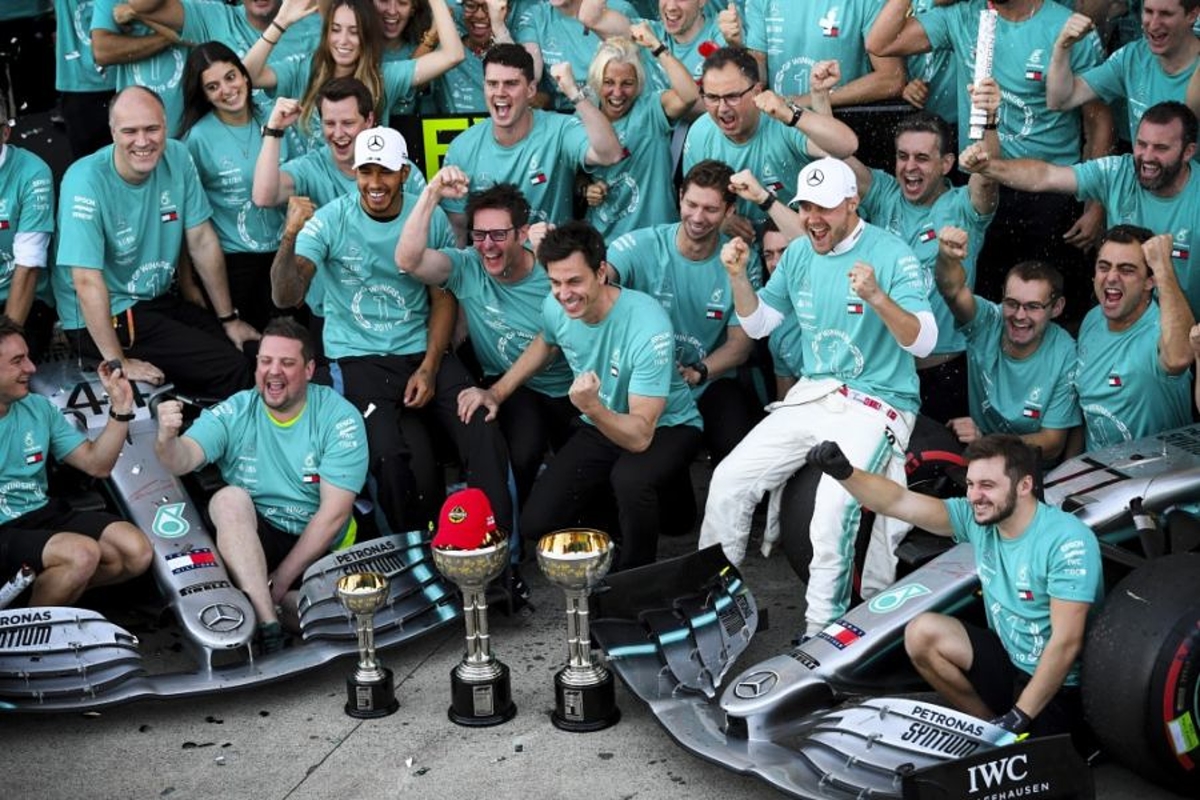Mercedes' sixth-straight title double was secured at the Japanese Grand Prix – a run of sequential success never before seen in Formula 1.
Lewis Hamilton or Valtteri Bottas will add the drivers' title to the constructors' championship crown secured at Suzuka, with the Briton in pole position for his sixth title overall and fifth since leaving McLaren for the Silver Arrows in 2013.
Hamilton has racked up individual success like only one man before, Michael Schumacher, in the intervening period and is well-fancied to wipe out most of the German's iconic milestones before hanging up his racing gloves for good.
But what of Mercedes? Their run atop F1 has often been written off as the lucky result of gambling on getting F1's new engine right when the regulations changed for 2014.
However, two more rounds of regulation changes have come and gone since then and still the Silver Arrows are largely unbeatable.
So how do they compare to the other two teams to enjoy sustained success in the modern era, Ferrari and Red Bull? Let's take a look…
MERCEDES: 117 Grands Prix (Australia 2014 - Japan 2019)
6 Constructors' titles (100%)
6* Drivers' titles (100%) [*Hamilton or Bottas in 2019]
86 victories (73.50%)
92 pole positions (78.63%)
60 fastest laps (51.28%)
174 podiums (74.35%)
47 one-twos (40.17%)
RED BULL: 77 Grands Prix (Bahrain 2010 – Abu Dhabi 2013)
4 Constructors' titles (100%)
4 Drivers' titles (100%)
41 victories (53.25%)
52 pole positions (67.53%)
35 fastest laps (45.45%)
95 podiums (61.69%)
11 one-twos (14.29%)
FERRARI: 102 Grands Prix (Australia 1999 – Brazil 2004)
6 Constructors' titles (100%)
5 Drivers' titles (83.33%)
63 victories (61.76%)
54 pole positions (52.94%)
48 fastest laps (47.06%)
135 podiums (66.18%)
27 one-twos (26.47%)
The numbers make for stark reading, especially given the Silver Arrows have been continually compared to the Schumacher-era Ferrari in recent years.
While both Ferrari and Red Bull are viewed as truly dominant teams, and rightly so, they were not as ragingly superior in every category as Mercedes have been since 2014.
Even in McLaren's legendary stint atop the sport from 1988 to 1991 with Alain Prost and Ayrton Senna at the wheel, the only measure by which they outstrip Mercedes is in taking 79.69% of the pole positions on offer across four seasons, and the margin isn't exactly wide.
For reference, here are the numbers from what is widely accepted as the sport's most dominant run.
McLaren: 64 Grands Prix (Brazil 1988 – Australia 1991)
4 Constructors' titles (100%)
4 Drivers' titles (100%)
39 victories (60.94%)
51 pole positions (79.69%)
27 fastest laps (42.19%)
79 podiums (61.72%)
17 one-twos (26.56%)
Of course the ever-improving reliability, and more races per season play into Mercedes' hands here, but the averages remain instructive.
Perhaps it is time to start rethinking F1 history, and Mercedes' true place within it, for good.
Related











































 Grand Prix De Monaco 2025
Grand Prix De Monaco 2025  Gran Premio de España 2025
Gran Premio de España 2025  Grand Prix du Canada 2025
Grand Prix du Canada 2025  Grand Prix of Austria 2025
Grand Prix of Austria 2025  Grand Prix of Belgium 2025
Grand Prix of Belgium 2025  Grand Prix of Hungary 2025
Grand Prix of Hungary 2025  Grand Prix of Azerbaijan 2025
Grand Prix of Azerbaijan 2025  Grand Prix of Singapore 2025
Grand Prix of Singapore 2025  Gran Premio de la Ciudad de Mexico 2025
Gran Premio de la Ciudad de Mexico 2025  Grande Prêmio de São Paulo 2025
Grande Prêmio de São Paulo 2025  Qatar Grand Prix 2025
Qatar Grand Prix 2025  Grand Prix of Abu Dhabi 2025
Grand Prix of Abu Dhabi 2025 